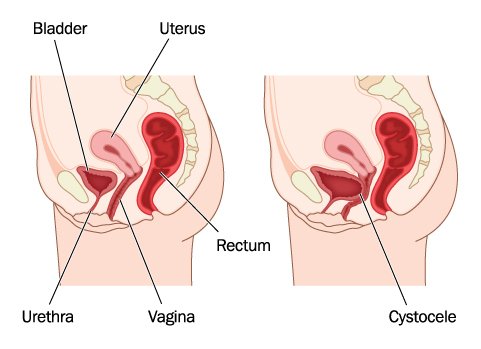
What Are the Benefits of Treating Pelvic Organ Prolapse with Pelvic Floor Therapy?
Read on to find out.
It’s Pelvic Organ Prolapse Awarenesss Month. Today we talk about something that’s often not talked about and lay out ways prolapse can be avoided and treated with proper pelvic floor physical therapy.
What Is Pelvic Organ Prolapse?
“Prolapse” refers to a descending or drooping of organs. Pelvic Organ Prolapse (POP) refers to the prolapse or drooping of any of the pelvic floor organs, including: the bladder, uterus, vagina, small bowel, or rectum. These organs are said to prolapse if they descend into or outside of the vaginal canal or anus.
Prolapse is sometimes given these specific names to describe which organ is descending:
Cystocele: The bladder falls backward into the front (anterior) vaginal wall
Urethrocele: A prolapse of the urethra (the tube that carries urine) into the vaginal wall
Uterine prolapse: prolapse of the uterus
Vaginal vault prolapse: prolapse of the vagina
Enterocele: Small bowel prolapse
Rectocele: the rectum falls forward into the back (or posterior) vaginal wall.
To learn more on each type, go to Voices for PFD.
How do I know I have a Prolapse?
Symptoms depend somewhat on which organ is in descent. If the bladder prolapses, urine leakage may occur. If it’s the rectum, constipation and uncomfortable intercourse often occur. A backache as well as uncomfortable intercourse often accompanies small intestine prolapse. Uterine prolapse is also accompanied by backache and pain or discomfort with intercourse.
Some people will feel nothing at all and can live with prolapse without affecting it function.
Common symptoms include:
- A feeling of “something falling out” of the vagina or rectal area
- A “bulge,” a “ball,” or “pressure” in the pelvic area, usually in the vaginal or rectal area.
- Low back pain
- Heaviness in the pelvic area
- Pain with sex
- Strong urge to urinate
- Leaking urine
- Gas incontinence or air escaping from the vagina
- Constipation
- Staining of feces on underwear
- Spotting or bleeding from the vagina
- Sexual dysfunction
- Inability to orgasm or reduced intensity/frequency of orgasm
- Pain with Kegel exercise
- Sacral pain
What Causes Pelvic Organ Prolapse?
Prolapse occurs when pressure in the abdomen is greater than the strength of the pelvic floor and deep core muscles that help keep organs in their place.
Common causes and risk factors include:
- Pregnancy, labor, and childbirth (the most common causes)
- Assistive birth: forceps, vacuum or a combination
- Diastasis Recti Abdominus (DRA or Diastasis Recti) separation and weak core
- Obesity
- Respiratory problems with a chronic, long-term cough
- Chronic constipation
- Poor posture
- Pelvic organ cancers
- Abdominal surgeries
- Hysterectomies
- Connective tissue disorders
- Genetics may also play a role in prolapse
- Heavy lifting and manual labor over time
- High impact sports over time
Treating Pelvic Organ Prolapse with Pelvic Floor Therapy
The therapists at Femina Physical Therapy can help with pelvic organ prolapse!
Some interventions might include:
- Posture and body mechanics training
- A physical therapist will help you restore your postural mechanics to optimally support you and your organs!
- Diastasis recti recovery
- A trained physical therapist will provide you with corrective exercises to help stabilize your core and to help the abdominal separation to come back together partially or completely. They will also evaluate you to be sure your muscles are creating enough tension across the midline of your body.
- Regain core control
- A functional core is essential to keep your organs in their places. A functional core will also help with essential functions like: walking, bending, lifting, running, even sitting with good body mechanics. Physical therapy can help you regain strength and support through your core muscles to help you get back to the activities you want to do.
- Breath Control and Proper Body Mechanics
- Therapy can help you learn invaluable lessons about how you should move to protect your organs and to keep them in the body.
- Pelvic Floor Dysfunction
- A trained pelvic floor therapist will help return strength, function, and flexibility to the pelvic floor to help you regain control.
Contact a Pelvic Floor Therapist
The physical therapists at Femina Physical Therapy can help with pelvic organ prolapse! Get scheduled for an appointment with one of our trained pelvic floor therapists to help return strength, function, and flexibility to the pelvic floor to help you regain support for your organs.
**This information is for educational purposes only and is not intended to replace the advice of your doctor.
